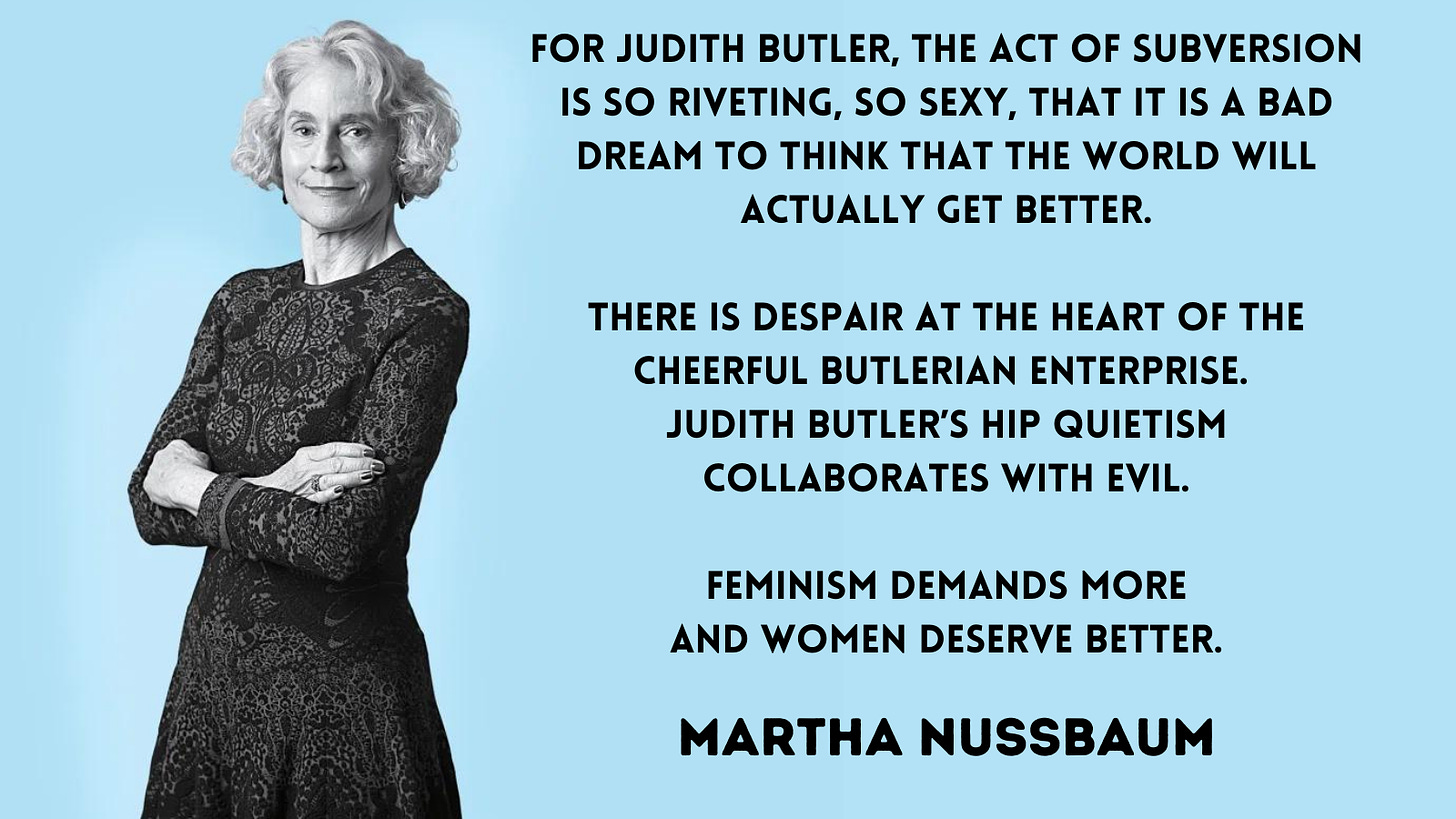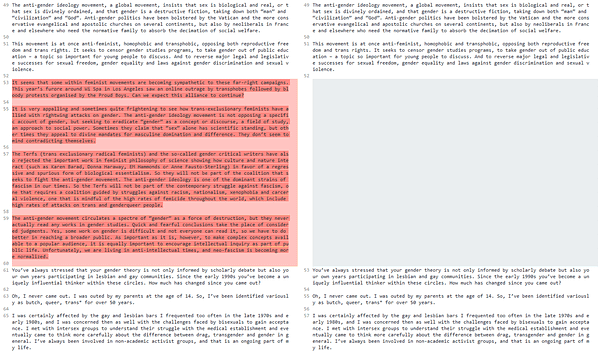The Professor of Parody
Judith Butler glamorizes symbolic subversion while ignoring the plight of women
On September 7, The Guardian published an interview with academic queer theorist Judith Butler. Butler is best known for her 1990 book “Gender Trouble: Feminism and the Subversion of Identity” which has been widely influential in universities and among American middle-class and elite liberals. Butler’s ideas about the ‘performativity’ of gender are considered foundational to queer theory and credited with advancing the agenda of gender identity ideology.
Notably, the interview was commissioned by an employee within the US branch of The Guardian.


Roughly eight hours later, an entire section of the interview was quietly pulled, with an easily missable sentence added to the end of the article, stating:
“This article was edited on 7 September 2021 to reflect developments which occurred after the interview took place.”
The deleted paragraphs are as follows:
“It seems that some within feminist movements are becoming sypmathetic to these far-right campaigns. This year’s furore around Wi Spa in Los Angeles saw an online outrage by transphobes followed by bloody protests organized by the Proud Boys. Can we expect this alliance to continue?
It is very appalling and sometimes quite frightening to see how trans-exclusionary radical feminists have allied with right-wing attacks on gender. The anti-gender ideology movement is not opposing a specific account of gender, but seeking to eradicate ‘gender’ as a concept or discourse, a field of study, an approach to social power. Sometimes they claim that ‘sex’ alone has scientific standing, but other times they appeal to divine mandates for masculine domination and difference. They don’t seem to mind contradicting themselves.
The TERFs (trans-exclusionary radical feminists) and the so-called gender critical writers have also rejected the important work of in philosphy of science showing how culture and nature interact (such as Karen Barad, Donna Haraway, EM Hammonds or Anne-Fausto Sterling) in favor of a regressive and spurious form of biological essentialism. So they will not be part of the coalition that seeks to fight the anti-gender movement. The anti-gender ideology is one of the dominant strains of fascism in our times. So the TERFs will not be part of the contemporary struggle against fascism, one that requires a coalition guided by struggles against racism, nationalism, xenophobia and carceral violence, one that is mindful of the high rates of femicide throughout the world, which include high rates of attacks on trans and genderqueer people.
The anti-gender movement circulates a spectre of ‘gender’ as a force of destruction, but they never actually read any works in gender studies. Quick and fearful conclusions take the place of considered judgements. Yes, some work on gender is difficult and not everyone can read it, so we have to do better in reaching a broader public. As important as it is, however, to make complex concepts available to a popular audience, it is equally important to encourage intellectual inquiry as part of public life. Unfortunately, we are living in anti-intellectual times, and neo-fascism is becoming more normalized.”
Butler’s obtuse and inaccessible brand of ‘feminism’ appears to only apply to women she deems worthy, while prioritizing reductive projections of women. In repeating the slur of ‘TERF’, Butler has contributed to a climate of hostility towards women’s rights that has already resulted in violence and encourages ongoing censorship, abuse, and threats.
Feminism — the sort that exists outside of the ivory towers of corporate American academia — has long advocated for an end to male violence against women, and championed the notion that sex role stereotypes are harmful to all people in various degrees. What Butler calls “a regressive and spurious form of biological essentialism”, is an antidote to the regressive essentialism of gender identity, which claims that one is born with a gendered soul and the body must be surgically and chemically altered to match.
In 1999, Martha Nussbaum, an American philosopher and Professor of Law and Ethics at the University of Chicago, offered a rebuttal to Butler’s ideas in an essay titled “The Professor of Parody.”
In this essay, Nussbaum analyzes the works of Judith Butler, particularly her theory of gender performativity, and what Nussbaum calls Butler's “hip quietism” which “collaborates with evil”.
“The great tragedy in the new feminist theory in America is the loss of a sense of public commitment. In this sense, Butler’s self-involved feminism is extremely American, and it is not surprising that it has caught on here, where successful middle-class people prefer to focus on cultivating the self rather than thinking in a way that helps the material condition of others. Even in America, however, it is possible for theorists to be dedicated to the public good and to achieve something through that effort.
What precisely does Butler offer when she counsels subversion? She tells us to engage in parodic performances, but she warns us that the dream of escaping altogether from the oppressive structures is just a dream: it is within the oppressive structures that we must find little spaces for resistance, and this resistance cannot hope to change the overall situation. And here lies a dangerous quietism.
For Butler, the act of subversion is so riveting, so sexy, that it is a bad dream to think that the world will actually get better. What a bore equality is! No bondage, no delight. In this way, her pessimistic erotic anthropology offers support to an amoral anarchist politics.
Finally, there is despair at the heart of the cheerful Butlerian enterprise. The big hope, the hope for a world of real justice, where laws and institutions protect the equality and the dignity of all citizens, has been banished, even perhaps mocked as sexually tedious. Judith Butler's hip quietism is a comprehensible response to the difficulty of realizing justice in America. But it is a bad response. It collaborates with evil. Feminism demands more and women deserve better.”
Full text available here.









Excellent point regarding the courage and bravery of politically homeless women peaking right-leaning men and women.
I know I'd still be none the wiser to the inherent dangers mothers and daughters face. It's only being presented as a 'right-wing', nay, 'far-right' issue to discredit its legitimacy.
I am just a wee bit fed up of other women deciding who can and cannot be a feminist. I have been a feminist for the last 42 years and don't need or want women who have not been on the planet for that long telling me that I cannot be a feminist.
I do not do them the discourtesy of telling them they can't join the club. They need to think before they let their "bellies rumble".